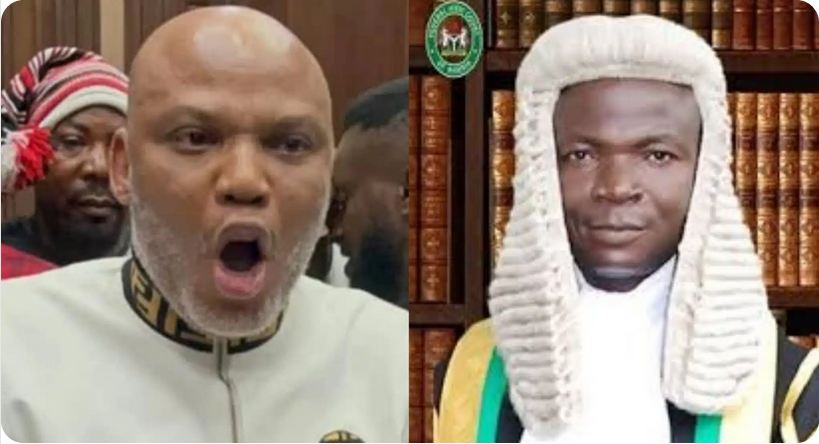
COURT DRAMA: Justice Omotosho Under Fire as Nnamdi Kanu Challenges Legality of His Trial
Abuja, Nigeria – November 7, 2025
The trial of Mazi Nnamdi Kanu, leader of the Indigenous People of Biafra (IPOB), took a dramatic and deeply unsettling turn today at the Federal High Court in Abuja, presided over by Justice James Omotosho.
What began as a routine court session evolved into a highly charged confrontation that once again cast a shadow over Nigeria’s judiciary and the government’s respect for the rule of law.
According to eyewitness accounts, the atmosphere in the courtroom was tense and emotional, as Justice Omotosho’s handling of fundamental legal questions appeared evasive, dismissive, and inconsistent with the principles of fair hearing guaranteed under the Nigerian Constitution.
During the heated session, Mazi Nnamdi Kanu repeatedly challenged the court to cite the specific written law under which he was being tried, a question that Justice Omotosho notably failed to answer.
Citing Section 36(12) of the 1999 Constitution, which states that “no person shall be convicted of a criminal offence unless that offence is defined and the penalty prescribed in a written law,” Kanu argued that the charges against him were based on a repealed statute, rendering the entire process unconstitutional.
His motion to have his plea expunged from the court record was ignored, while the presiding judge avoided taking judicial notice of the repealed law as required under the Evidence Act.
Legal analysts and observers have described this as a flagrant disregard for both constitutional and procedural justice, a troubling indication of what is already known, that Kanu’s trial is politically motivated rather than legally grounded.
The situation grew even more controversial when Justice Omotosho abruptly announced that he would not allow final written addresses from either party, a procedural right considered fundamental to criminal trials in Nigeria.
Legal experts have decried this as unprecedented and a clear violation of due process, arguing that it deprives the defendant of the constitutional right to challenge evidence and raise points of law before judgment.
The decision has intensified public suspicion of judicial bias and fueled widespread outrage across the country, with many Nigerians now openly questioning whether justice can still be expected in this case.
It will be recalled that on October 27, Mazi Nnamdi Kanu had formally asked Justice Omotosho to identify the legal basis for his continued trial.
The judge directed him to file a written address on the court’s jurisdiction, which Kanu personally submitted on October 30.
The prosecution has not filed any counter-motion since then, yet the judge continues to pressure Kanu to proceed with the trial.
Legal observers have called this insistence a direct assault on constitutional governance, as it appears designed to force a trial without first resolving the question of jurisdiction, the very foundation of any valid criminal proceeding.
Beyond the courtroom, the Nigerian government’s handling of Mazi Nnamdi Kanu’s case has drawn severe criticism both domestically and internationally.
Kanu was abducted from Kenya in June 2021 in what human rights organizations, including Amnesty International and the United Nations Working Group on Arbitrary Detention, have described as an “extraordinary rendition” an illegal act that violated both Kenyan and Nigerian law, as well as international conventions to which Nigeria is a signatory.
Despite multiple court orders, including a landmark 2022 judgment by the Nigerian Court of Appeal that discharged and acquitted Kanu of all charges, the government has continued to detain him in solitary confinement at the Department of State Services (DSS) facility in Abuja.
The UN Human Rights Council and several international bodies have since called for his unconditional release, citing violations of due process, arbitrary detention, and psychological torture.
However, the Nigerian government has persistently defied these rulings and resolutions, further undermining its international credibility and deepening the perception that Kanu’s case is being politically weaponized to suppress dissent.
Analysts warn that the government’s refusal to comply with its own laws and international obligations threatens to erode confidence in Nigeria’s justice system, isolate the country diplomatically, and inflame tensions across the southeast region.
As events unfold, the world watches closely, not merely to see what happens to Nnamdi Kanu, but to judge whether Nigeria’s judiciary still upholds the Constitution it swore to defend.